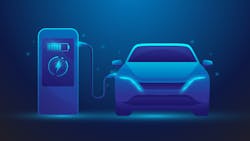Earlier this summer, Tesla announced a major deal with both Ford and General Motors allowing electric vehicles built by the legacy automakers to access the EV manufacturer’s network of 17,000 fast-charging ports across the country.
It’s a big step for Ford and GM, and it may also have some major ramifications throughout the auto industry. Tesla’s charging network is the largest DC Fast Charge system in the country, and while several other companies such as ChargePoint have worked to rival Tesla, other automakers may follow Ford and GM’s lead and make a deal to join Tesla.
The charging landscape looks very different from a few years ago, and as charging stations become more universally accessible, they’re becoming more of a sound bet for collision shops to invest in.
“I’d be more inclined to get one early on, even if you have very few cars coming in,” says Darrell Amberson, president of Minnesota-based LaMettry’s Collision. “As soon as you start to fix one or two EVs, it makes sense to have one in your shop.”
More EVs are on the road than ever before, which means the odds have never been better that you’ll see one roll into your shop. When that happens, having an EV charger can help that repair go as smoothly as possible.
Budgeting for a Charger
Data from Hertz shows there are around 1.7 million EVs on U.S. roads right now. While that’s still less than 1 percent of the total number of vehicles on the road, it is more than quadruple the number that were on the road just five years ago.
Amberson says it’s still very important to keep track of what makes of EVs are coming into your shop when deciding what charger to purchase – even though OEMs such as Ford and GM will be able to use Tesla chargers in 2024, there is still a significant lack of cross-compatibility between Tesla’s chargers and other EVs.
Tesla’s share of the EV market has taken a significant dip since the start of 2022, but they still dominate the scene with around 50 percent market share. Until more OEMs join Tesla’s network or some other push for standardized EV chargers takes hold, the charger you pick should accurately reflect the kinds of vehicles your shop works on.
“Things are evolving, but at this point it’s still a concern,” Amberson says. “We have primarily Tesla charging stations in our shops because all our shops are Tesla-certified.”
Once your shop determines an EV charger makes sense, one major benefit is the cost. Chargers are fairly affordable, though the amount your shop will pay can vary depending on the type of charger selected. Level 2 chargers, which the U.S. Department of Transportation says can bring a BEV to 80 percent charge from empty in as little as four hours, can cost anywhere from $1,000 to $20,000 when factoring in installation costs.
DC fast chargers, which can charge vehicle’s battery significantly faster, cost much more. USDOT estimates a shop will have to drop anywhere from $14,000 to $91,000 for one fast charger.
Amberson says some of that cost will be recuperated by enabling your shop to work on more EVs. He also says some of the cost to charge a vehicle can be passed on to insurance during a repair.
“I’m not going to tell you that an insurance company is going to pay for it in every circumstance, but you can make a very good argument for charging the insurance company for charging the vehicle to at least a certain level as a cost of the repair,” he says.
Installing chargers outside your shop and having customers or passers-by pay to park and charge their vehicles can be viable if traffic is strong enough.
In-Shop Logistics
Once your shop makes the decision to install an EV charger, Amberson says there are several factors to take into account when deciding where to put it.
“Obviously, there are the questions of space and convenience, as well as how many cars you expect to be charging a day,” Amberson says. “Another is power. You need to have adequate power and sufficient wiring going to a charging station to be able to run it.”
Charging an EV is a necessary part of the repair process. Though specific rules will vary between different OEMs, most have some requirement about bringing a vehicle to a certain level of charge during the repair process. Many require a certain level of power to run certain procedures and tests.
There are some ways to charge a vehicle short of a charging station, but many manufacturers recommend or require that their vehicles be brought up to a certain point of charge during a repair and for certain procedures. Because of those requirements, if your shop works on EVs in any capacity, having a charger makes sense.
Amberson’s shops will try to find ways to charge a vehicle throughout its repair process and do it in a way where it won’t be in the way of other shop operations.
“Ideally, it’ll be staged for the next step. For instance, if it’s come out of the body tech stall and is getting ready to go in for paint but the paint department isn’t quite ready for it, that’s a good time. Maybe the car is assembled but the detailers aren’t ready, or the final safety check isn’t ready,” Amberson says.
If a vehicle is going to stay in your shop for multiple days, Amberson says there are considerations for charging overnight. Different manufacturers have different requirements, but if there’s a damaged battery, it’s best not to charge the vehicle after hours.
“You don’t want to heat it up and have it start on fire,” Amberson says. “Especially when you’re not there.”
Expect Expansion
If your shop has the space and clientele to support one, having an EV charger can be a good option to help speed along EV repairs and attract more electrified business. EVs still make up less than 1 percent of vehicles on the road today, but their expansion has been rapid. Amberson says getting in now can help save your shop in the future.
“We don’t know if some of the specific forecasts are accurate, but certainly it’s very safe to say that EVs as a percentage of the number of cars sold today are going to increase considerably going forward,” he says. “We know that we’re going to have more and more EVs.”
About the Author

Noah Brown
Noah Brown is a freelance writer and former senior digital editor for 10 Missions Media, where he facilitated multimedia production several of the company's publications.
